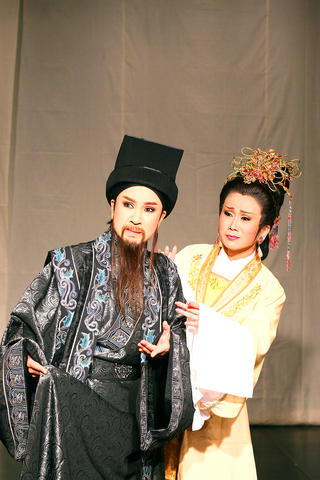Taiwanese Opera (歌仔戲) once dominated Taiwan's cultural landscape. In the 1960s and 1970s - a period considered the medium's golden age - radio stations broadcasted opera by the hour and it was one of a handful of entertainment programs on television. Today, however, people searching for a little entertainment or distraction are more inclined to watch a movie, see a play or just stay at home and chat on line.
But Hsu Ya-fen Fine Arts Opera (許亞芬歌子戲劇坊) and Luan-Tan-Chiao Beiguan Opera Troupe (亂彈嬌北管劇團) continue to draw the crowd by adapting riveting classical Chinese tales to Taiwanese Opera using the best in costuming and special effects to interest a younger generation of theatergoers.
"We use the story and language to attract the older generation," said Chiu Ting (邱婷), producer of The Search for the Orphan (搜孤救孤), which opens to today at Metropolitan Hall.

Born into a family of beiguan musicians (her father Chiu Huo-rang (邱火榮) is one of Taiwan's foremost beiguan maestros), Chiu Ting decided last year she wanted to move into Taiwanese Opera as a means of appealing to a broader crowd, and one not just in Taipei.
Chu feels she could have no better collaborator than Hsu. She said the work should also appeal to "university students and foreigners" because it uses modern stage design and a visual narrative that is easy to follow.
The Search for the Orphan is a tale of political treachery, sacrifice and revenge. Adapted from the literary classic The Orphan of Zhao (趙氏孤兒), it tells the story of an attempted massacre of a family and how one survivor returns to seek revenge.

In the next few months tough decisions will need to be made by the Taiwan People’s Party (TPP) and their pan-blue allies in the Chinese Nationalist Party (KMT). It will reveal just how real their alliance is with actual power at stake. Party founder Ko Wen-je (柯文哲) faced these tough questions, which we explored in part one of this series, “Ko Wen-je, the KMT’s prickly ally,” (Aug. 16, page 12). Ko was open to cooperation, but on his terms. He openly fretted about being “swallowed up” by the KMT, and was keenly aware of the experience of the People’s First Party

Aug. 25 to Aug. 31 Although Mr. Lin (林) had been married to his Japanese wife for a decade, their union was never legally recognized — and even their daughter was officially deemed illegitimate. During the first half of Japanese rule in Taiwan, only marriages between Japanese men and Taiwanese women were valid, unless the Taiwanese husband formally joined a Japanese household. In 1920, Lin took his frustrations directly to the Ministry of Home Affairs: “Since Japan took possession of Taiwan, we have obeyed the government’s directives and committed ourselves to breaking old Qing-era customs. Yet ... our marriages remain unrecognized,

Not long into Mistress Dispeller, a quietly jaw-dropping new documentary from director Elizabeth Lo, the film’s eponymous character lays out her thesis for ridding marriages of troublesome extra lovers. “When someone becomes a mistress,” she says, “it’s because they feel they don’t deserve complete love. She’s the one who needs our help the most.” Wang Zhenxi, a mistress dispeller based in north-central China’s Henan province, is one of a growing number of self-styled professionals who earn a living by intervening in people’s marriages — to “dispel” them of intruders. “I was looking for a love story set in China,” says Lo,

During the Metal Ages, prior to the arrival of the Dutch and Chinese, a great shift took place in indigenous material culture. Glass and agate beads, introduced after 400BC, completely replaced Taiwanese nephrite (jade) as the ornamental materials of choice, anthropologist Liu Jiun-Yu (劉俊昱) of the University of Washington wrote in a 2023 article. He added of the island’s modern indigenous peoples: “They are the descendants of prehistoric Formosans but have no nephrite-using cultures.” Moderns squint at that dynamic era of trade and cultural change through the mutually supporting lenses of later settler-colonialism and imperial power, which treated the indigenous as